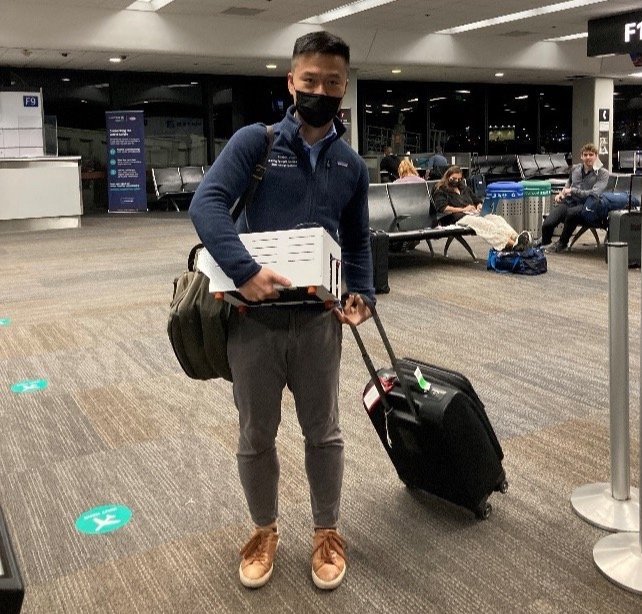
From Convergence Scholar to CEO
by Jeremy Li, PhD
CEO, Cision Vision, Inc.
I am writing this story while traveling to a customer site for a product demo. It definitely feels surreal to look back at my journey as a Convergence Scholar to now entrepreneur. Calling it a “roller coaster ride” would be an understatement, and I have enjoyed every second of it!
Jeremy traveling to go to his first-ever customer demo
Five years ago, when I came to the MIT Koch Institute for Integrative Cancer Research as a postdoc, my goal was to become a professor. I love research, teaching, and I have always enjoyed all aspects of mentoring in an academic setting. Being a postdoc at MIT was the perfect environment as I aspired to become a tenure track professor. But my plan soon hit some serious roadblocks in the lab and in my personal life as I needed to relocate to stay close to my family. That’s when I felt that my dream of becoming a professor started fading. I felt quite anxious during that time and even started questioning my career choices.
Fortunately, I had the opportunity during that time to get immersed in MIT’s vibrant startup culture, and had the unique opportunity to explore other avenues to translate my research into a company. At that time, I was working with Prof. Angela Belcher on a brand new technology for visualizing lymph nodes directly in real time without injection or radiation.
Several generations of prototypes at Cision Vision from first to the newest iteration (left to right).
I participated in three programs that helped me broaden my horizons as an entrepreneur: the NSF I-Corp program, the Convergence Scholar Program, and the Venture Mentoring Program.
The NSF I-Corps program is a grant that requires awardees to interview at least 100 potential customers within 8 weeks. The process was really informative since it shifted my perspective towards the needs of customers. As a result, I was able to define a market with extremely pressing needs for our technology. Focusing on customer interviews is now an integral part of Cision Vision’s DNA, and we have interviewed more than 500 clinicians worldwide to date. The deep understanding of our customer base and customer needs was a huge confidence booster for me as an entrepreneur, and it was also tremendously valuable in fundraising meetings with investors.
The Convergence Scholar Program (CSP) was another extremely rewarding experience in building important connections to help guide my decisions when launching the new company. There is so much to learn when it comes to navigating our complex healthcare system. Thanks to CSP, I was able to attend a Surgeon Conference and get support from medical billing specialists, business executives, veteran entrepreneurs, as well as interview medical practitioners. The CSP seminars were also helpful, with speakers from all parts of the science communication-management-leadership spectrum and diverse backgrounds and expertise—many of whom were entrepreneurs and venture capitalists. Most importantly, I continue to remain engaged with the program as an alumni by mentoring other scholars—some with very strong entrepreneurial aspirations!
I also had the privilege to participate in the MIT Venture Mentoring Service (VMS). VMS matches aspiring MIT founders with successful MIT entrepreneurs so that new founders can receive top quality mentoring. I was matched with Drs. Jay Stein, cofounder of Hologic, one of the biggest medical device companies in the world, and Kyri Dunussi-Joannopoulos, former Senior Director of the Immunology and Autoimmunity program at Pfizer. They took precious time out of their busy schedule to share their experience through regular meetings, and guided my decisions as I learned to navigate uncharted waters, especially during the early stages of launching the company.
Until this day, I continue to learn as an enterpreneur. None of these experiences would have been possible without the opportunities made available at the Koch Institute for Integrative Cancer Research, and more broadly, MIT. Being part of such a supportive community with the guidance of Drs. Belcher, Fadel, Stein, Dunussi-Joannopoulos, as well as the entire CSP and VMS programs has been an immense privilege, and I am deeply grateful for continuing to be part of such a supportive science ecosystem.
Customer demo of Cision Vision’s prototype
Jeremy Li is CEO of Cision Vision, Inc. He founded the company in 2020 with Prof. Angela Belcher, faculty member at the Marble Center for Cancer Nanomedicine, member of the Koch Institute for Integrative Cancer Research, and Head of the Bioengineering Department at MIT.



